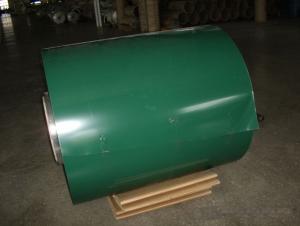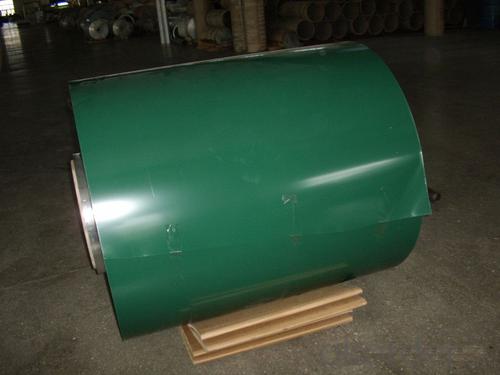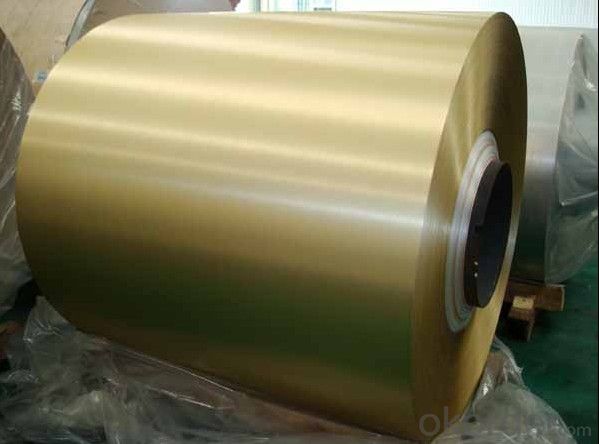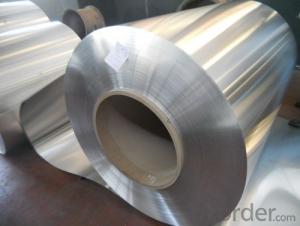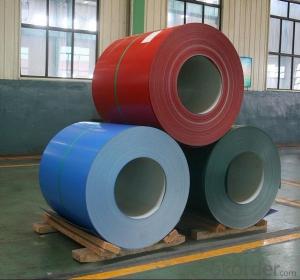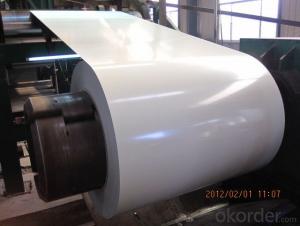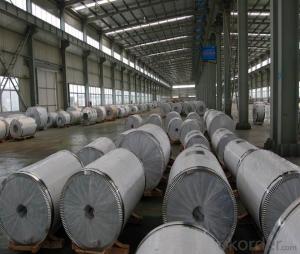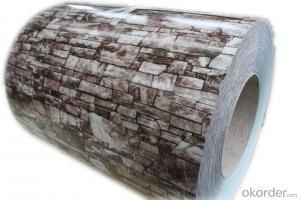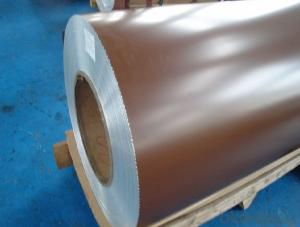Paramount Aluminum Coils - Coated Aluminum Coil for Aluminum Ceilings
- Loading Port:
- Shanghai
- Payment Terms:
- TT OR LC
- Min Order Qty:
- 5 m.t.
- Supply Capability:
- 60000 m.t./month
OKorder Service Pledge
OKorder Financial Service
You Might Also Like
Specification
Coated Aluminium Coil for Aluminium Ceilings
Description
Alloy | 1060, 1100, 3003, 8011, etc. |
Temper | H16, H18, H24, H26, H28 |
Thickness | From 0.05mm to 3.0mm |
Width | Standard width:1240mm |
Special width:1300mm, 1520mm, 1570mm, 1595mm | |
Diameter | Standard dia:1200mm |
Interior dia:150mm,405mm,505mm | |
Weight | 2.5 T/coil,3.0 T/coil |
Coating | PE, PVDF, ACRYLIC |
Surface | Embossed, mill finish, coated |
Color | AS to code RAL |
Gloss | 10-90%(EN ISO-2813:1994) |
Coating Thickness | PE: more than 18 micron |
PVDF: more than 25 micron | |
Coating Hardness(pencil resistance) | More than 2h |
Coating adhesion | 5J (EN ISO-2409:1994) |
Impact Resistance | No peeling or cracking(50 kg/cm,ASTMD-2794:1993) |
Flexibility(T-bend) | 2T |
MEK resistance | More than 100 |
Advantage | 1.High temperature resistant 2.Weathering resistant 3.Scrubbing resistant 5.Acid or alkali proof 6. Fireproof 7.Light weight material is easy to construct and install |
Out package | Wooden splint with export standard |
Application | ACP, wall cladding, facades, roofs and canopies, ceilings, signboards, blind window, display platforms, electrical panels, etc |
Manufacturing
Decoiler → Accumulator →Tension Leveler →Acid & Alkali Cleaner → Rinse →Conversion Treatment → Priming coater →Infrared Curing Oven →Main coater →Floatation Curing Oven →Strippable Film Applicator → Exit Accumulator → Recoiler
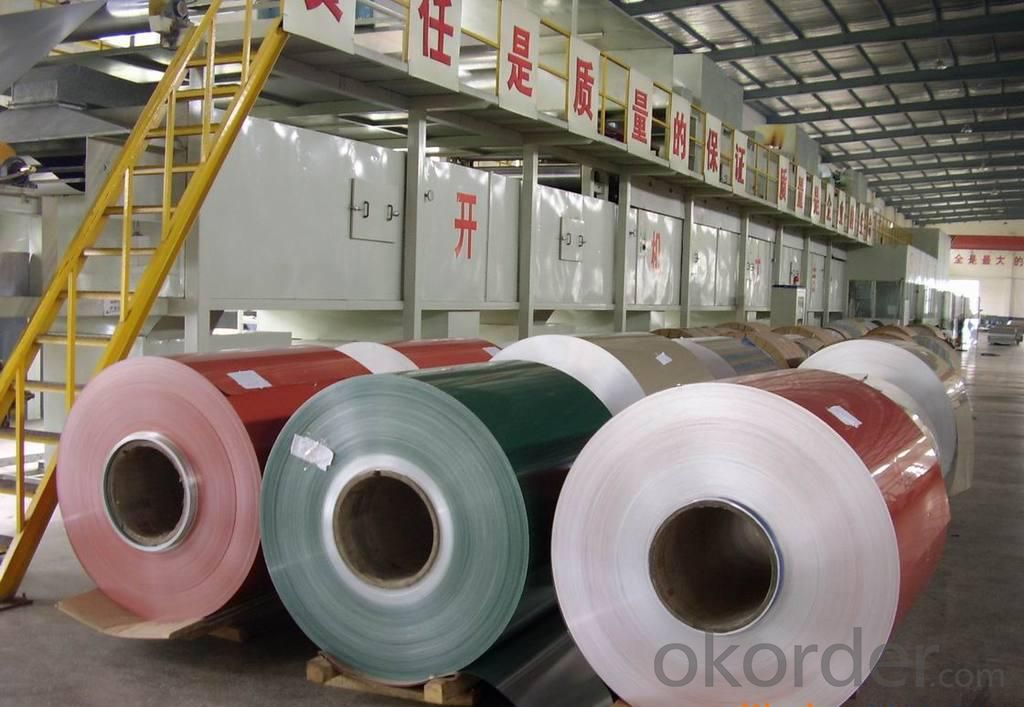
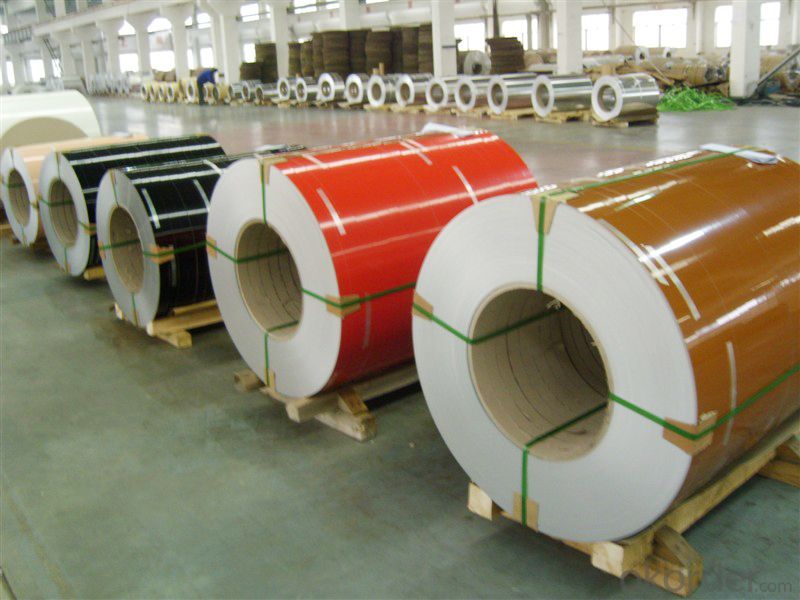
Polyester Coatings (PE)
PE (polyester) coatings exhibit an excellent combination of hardness, flexibility, flow, appearance, and superior resistance to dirt retention in indoor and outdoor applications. These coatings are highly resistant to abrasion, metal marking, staining, and marring, and require minimal maintenance. Glazetech uses polyester paints which provide excellent colour and gloss retention properties.
Polyvinylidene Fluoride Coatings (PVDF)
PVDF (polyvinylidene fluoride) is a chemical resistant thick film barrier coating commonly used in architectural applications where both excellent appearance and substrate protection must be maintained over a long period of time. This coating is unaffected by most chemicals and solvents and has excellent wear and abrasion resistance. PVDF also has a high dielectric strength, excellent resistance to weathering and the ability to self extinguish.
Application
Widely used in manufacturing of products as well as other industrial applications like:
Products Materials: PP cap stock, the traffic sign, air-conditioner heat and exchangers, food container, household foil, pharmaceutical packing, cigarettes packing etc.
Building Materials: aluminum curtain wall base plate, ACP, aluminum, ceilings, aluminum sheets, honeycomb panels and aluminum roofing, lighting decoration, household electrical appliances, food package (such as pop can cover & ring-pull), furniture ect.
FAQ
--Q: Do you provide free samples?
--A: Yes, free samples will be sent to you on freight at destination.
--Q: Can I get your latest products catalogue?
--A: Yes, it will be sent to you in no time.
--Q: What is the MOQ?
--A: 2 tons
--Q: What are your payment terms?
--A: We accept L/C, T/T.
--Q: What kinds of alloy can you supply?
--A: 1000 series: 1050, 1060, 1070, 1100, 1145, 1200
3000 series: 3003, 3004, 3105, 3104
5000 series: 5052, 5083, 5754, 5182
6000 series: 6061, 6063, 6062, 6063
8000 series: 8011, 8021
--Q: What kinds of temper can you supply?
--A: O-H112: O,H12,H14,H16,H18,H22,H24,H26,H,32,H34,H111,H112
T3, T4, T6
- Q: Are aluminum coils suitable for manufacturing cookware?
- Aluminum coils, indeed, prove to be appropriate for the production of cookware. The reason behind aluminum's popularity in cookware lies in its exceptional heat conductivity, which results in uniform heating and efficient cooking. Moreover, its lightweight and sturdy nature make it convenient to handle and long-lasting. Additionally, aluminum possesses resistance against rust and corrosion, making it the perfect choice for cookware frequently exposed to water and heat. Nevertheless, it is crucial to acknowledge that uncoated aluminum cookware might react with certain acidic or alkaline foods, leading to a metallic taste. To tackle this issue, numerous aluminum cookware manufacturers utilize non-stick coatings or anodized finishes to prevent food reactions and enhance the cookware's durability. All in all, aluminum coils serve as a suitable material for the manufacture of cookware, but it is imperative to consider the specific requirements and coatings necessary for various types of cookware to ensure safety and optimal performance.
- Q: so i've been using natural deodorants that don't have aluminum, but they only work for a little while. i've heard that aluminum may cause Alzheimer's, and i have a history of Alzheimer's. do you know of any web sights that can confirm/deny this? or if you know of any deodorants that work really well that don't have aluminum! this is really getting annoying
- yes it can cause cancer try Tom's of Maine it's natural
- Q: Are there any specific regulations for the transportation of aluminum coils?
- The transportation of aluminum coils is subject to specific regulations aimed at guaranteeing their safe handling and transport in order to prevent any accidents or damage. These regulations encompass various key requirements: 1. Packaging: To avoid any shifting, damage, or falling during transportation, aluminum coils must be securely packaged in appropriate containers. This may involve the utilization of strapping, banding, or shrink-wrapping techniques. 2. Weight limitations: Depending on the mode of transportation employed, there are weight restrictions in place for the transportation of aluminum coils. These limitations are implemented to ensure the stability and safety of the vehicle during transit. 3. Loading and unloading procedures: It is essential to follow proper loading and unloading procedures to minimize the risk of coil damage and to ensure worker safety. This may necessitate the use of specialized equipment like cranes or forklifts. 4. Regulations for hazardous materials: In certain instances, aluminum coils may be considered hazardous materials due to their flammability or other characteristics. In such cases, additional regulations and requirements may be applicable, such as appropriate labeling, documentation, and handling procedures. 5. Transportation permits: Depending on the size, weight, and destination of the aluminum coils, specific permits or licenses may be necessary for their transportation. These permits ensure compliance with local, state, and federal regulations. It is crucial for companies involved in the transportation of aluminum coils to possess awareness of and adhere to these regulations to ensure the secure and efficient transport of the coils. Failure to comply with these regulations can result in fines, penalties, or even legal ramifications.
- Q: What is the maximum coil diameter for aluminum coils?
- The maximum coil diameter for aluminum coils can vary depending on the specific application and manufacturing process. However, in general, the maximum coil diameter for aluminum coils typically ranges from 60 inches (152.4 cm) to 120 inches (304.8 cm). This diameter limit is determined by factors such as the size of the production equipment, the thickness and width of the aluminum sheet being processed, and the handling capabilities of the facility. It is important to consult with the manufacturer or supplier to determine the specific maximum coil diameter for a particular aluminum coil product.
- Q: What are the vibration damping properties of aluminum coils?
- Aluminum coils have good vibration damping properties due to their inherent stiffness and damping capacity. The material's high density and low modulus of elasticity allow it to absorb and dissipate vibrations effectively, reducing the transmission of energy through the coil. This makes aluminum coils ideal for applications requiring vibration control and noise reduction.
- Q: Hello, I'd like to ask you a question. Can the aluminum coil be continuously pressed and cooled by kerosene?
- It's better not to use 0#. I'm sorry, I didn't see it a few days ago
- Q: How much is the rust-proof and thermal insulation aluminum coil?
- 3003 alumal alloy is the best and common rust-proof and thermal insulation aluminum coil. The price depends on the thickness and width you need.
- Q: Can aluminum coils be used in the manufacturing of medical devices?
- The use of aluminum coils in the manufacturing of medical devices is possible. Aluminum is a versatile material that offers numerous advantages for medical device production. It possesses qualities such as being lightweight, corrosion-resistant, and possessing good thermal conductivity. These properties make aluminum coils suitable for a variety of medical applications, including medical imaging equipment, surgical instruments, and prosthetics. Medical imaging devices, like MRI and CT scanners, often utilize aluminum coils for transmitting and receiving electromagnetic signals. Aluminum's electrical conductivity allows for efficient signal transmission, improving the precision and quality of medical imaging. Furthermore, the lightweight nature of aluminum makes it easier to handle and maneuver during medical procedures. Surgical instruments also benefit from the use of aluminum coils in their manufacturing. These instruments require materials that are both sterilizable and durable, with high strength. Aluminum meets these criteria as it can be easily sterilized using various methods, such as steam, ethylene oxide, or gamma irradiation. Additionally, its durability ensures that the instruments can withstand repeated sterilization cycles without degradation, while its high strength guarantees they can endure the forces applied during surgical procedures. Moreover, aluminum can be employed in the production of prosthetics, specifically artificial limbs. The lightweight nature of aluminum makes it an excellent choice for creating prosthetic devices that are comfortable for patients to wear and move around with. Additionally, its corrosion-resistant properties make it suitable for long-term use, as it can endure exposure to body fluids and environmental factors. In conclusion, the use of aluminum coils in the manufacturing of medical devices is indeed possible. The lightweight, corrosion-resistant, and electrically conductive properties of aluminum make it a valuable material for medical applications, contributing to the development of advanced and reliable medical devices.
- Q: Is there any elements that can be added to aluminum to create any compound?
- Which industries? while you're actually not greater particular the checklist can pass on perpetually. i'm going to checklist some nonetheless: Hydrogen-Used to make ammonia and for hydrogenation techniques like the production of liquid fuels and margarine. Ammonia-Used to make fertilizer for agriculture. Sulfuric acid-fabric ending, prescribed drugs, pesticides, oil-nicely acidification, preserving coatings, purification of petrol, manufacture of detergents, explosives....... Carbon-Used for all smelting of metals Iron-For the production of steel. Oxygen-Steelmaking, paint pigment, welding, rocket gas. As you may locate the checklist is getting ridiculous. Sulfuric acid is the main used yet you may look this info up in any good inorganic chemistry textbook.
- Q: Can aluminum coils be recycled multiple times?
- Yes, aluminum coils can be recycled multiple times. Aluminum is a highly recyclable material, and the recycling process does not degrade its quality. This means that aluminum coils can be melted down and reformed into new coils multiple times without any loss in their performance or properties. Recycling aluminum not only helps to conserve natural resources but also saves energy compared to producing new aluminum from raw materials. Therefore, aluminum coils are a sustainable and environmentally friendly choice that can be recycled multiple times.
Send your message to us
Paramount Aluminum Coils - Coated Aluminum Coil for Aluminum Ceilings
- Loading Port:
- Shanghai
- Payment Terms:
- TT OR LC
- Min Order Qty:
- 5 m.t.
- Supply Capability:
- 60000 m.t./month
OKorder Service Pledge
OKorder Financial Service
Similar products
Hot products
Hot Searches
Related keywords
